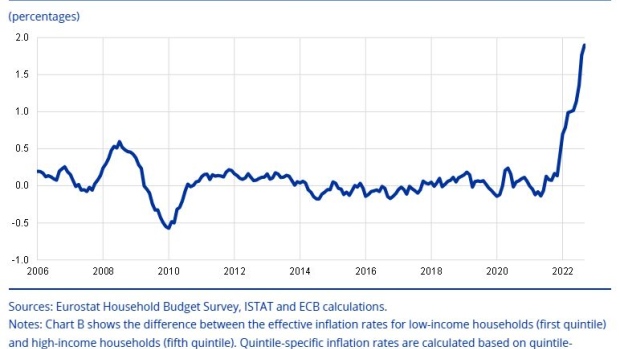Nov 9, 2022
Euro Area’s Inflation Shock Weighs Most on Poorest Households
, Bloomberg News

(Bloomberg) -- The euro area’s poorest households are disproportionately suffering from record inflation and also have smaller financial buffers to cope with the shock, according to European Central Bank research.
With less affluent households spending a greater share of income on food and energy -- whose costs have surged -- they face a higher effective inflation rate than richer peers. The difference is currently the widest since 2006, researchers said in an Economic Bulletin article published on Wednesday.
“Inflation in energy and food prices has major distributional effects across low and high-income households,” the analysts wrote. “Low-income households are more vulnerable to these price shifts, as they spend a higher proportion of their total consumption expenditure on essentials.”
Different spending patterns also offer richer households an additional way of coping with rising prices. As they typically buy more expensive items in any given category -- like branded products instead of white-label ones -- they can substitute those with cheaper alternatives.
Since lower-income households can’t save much income, they have much smaller cushions to absorb a rising cost of living.
They also tend to judge government measures to help consumers less favorably than richer peers, suggesting there’s “scope for more effectively targeting” such interventions, according to the study by economists Evangelos Charalampakis, Bruno Fagandini, Lukas Henkel and Chiara Osbat.
In a separate statement, the ECB said consumers slightly raised expectations for inflation over the next 12 months to 5.1% in September. They also expect the economy to develop much less favorably in the same period than in a previous survey round.
©2022 Bloomberg L.P.






